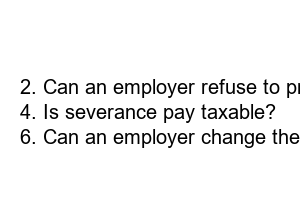퇴직금 조회
Title: Unveiling the Facts: Severance Pay Inquiry Explained
Subheadings:
1. What is Severance Pay?
2. How is Severance Pay Calculated?
3. Does Severance Pay Apply to All Employees?
4. Is Severance Pay Mandated by Law?
5. How Can Employees Negotiate Severance Packages?
6. Are There Any Tax Implications for Severance Pay?
7. Common FAQs about Severance Pay
Introduction:
When it comes to employment termination, one important aspect that requires clarity is severance pay. In this blog post, we will delve into the intricacies of severance pay to help employees understand its nature, calculation methods, employment coverage, legal obligations, negotiation tactics, tax implications, and address some commonly asked questions.
1. What is Severance Pay?
Severance pay refers to compensation provided by an employer to an employee who is terminated due to reasons beyond their control, such as company downsizing, restructuring, or layoffs. It serves as a financial cushion during the employee’s transitional period.
2. How is Severance Pay Calculated?
Severance pay is typically based on several factors, including the employee’s length of service, salary, and the company’s policies. For instance, an organization might offer one week’s salary for every year of service. However, each company may have different formulas to determine the payout.
3. Does Severance Pay Apply to All Employees?
Severance pay generally applies to employees who are laid off involuntarily. It may not be applicable in cases of voluntary resignations, retirements, or misconduct leading to termination. Unionized workers may have specific provisions in their collective bargaining agreements.
4. Is Severance Pay Mandated by Law?
In most countries, including the United States, there are no federal laws mandating severance pay. However, some states or countries may have specific regulations or requirements, such as the Worker Adjustment and Retraining Notification (WARN) Act, which mandates certain employers to provide advance notice or severance pay in the event of significant layoffs or plant closures.
5. How Can Employees Negotiate Severance Packages?
Negotiating a fair severance package can be crucial. It’s advisable to consult an employment attorney or seek guidance from HR professionals who can discuss contractual agreements, non-compete clauses, and ensure a satisfactory severance package that covers financial aspects, benefits, and non-monetary considerations.
6. Are There Any Tax Implications for Severance Pay?
Severance pay is generally subject to income taxes. However, specific tax laws vary from country to country. In some cases, the tax treatment may be different for lump-sum payments compared to periodic payments. It is advisable for employees to consult with tax professionals to understand the implications in their specific jurisdiction.
Conclusion:
Understanding the fundamentals of severance pay is essential for employees facing termination. From its definition, calculation methods, and applicability to negotiation tactics and tax implications, employees need to be well-informed to ensure a smooth and fair transitional period. If you have any questions regarding severance pay, refer to our comprehensive FAQs section below for further clarity.
FAQs:
1. Does severance pay include unused vacation or sick leave?
2. Can an employer refuse to provide severance pay?
3. How long does severance pay last?
4. Is severance pay taxable?
5. What happens if an employee rejects a severance package?
6. Can an employer change the terms of a severance package?

